Beyond the Stars: How American Consumers Use Reviews to Choose Local Businesses
GatherUp Local Business Review Survey - Q4 2024
How do local business reviews influence consumer behavior, what are the dominant habits of review readers and writers, and what are the optimal practices for local business owners when responding to reviews? These are the questions GatherUp set out to answer in undertaking this survey so that your local business can make data-based local search marketing decisions.
Methodology
We surveyed in November 2024 over 1,200 Americans through SurveyMonkey - full census balance for age and gender, making this one of the largest review-oriented surveys in the industry. Respondents were asked to answer a qualifying question to ensure they were engaging in some way with local business reviews before being allowed to participate in the survey. All numbers in the analysis of this survey have been rounded up for ease of use.
The survey has been broken out into three parts. You can click on the items below to jump to each section.
.png?width=800&name=Beyond%20the%20stars%20-%20a%20few%20favorite%20takeways%20(2).png)
A few favorite takeaways at a glance
- 85% of consumers feel a degree of trust in online local business reviews
- Fewer than 1% of consumers never consult reviews before selecting a local business
- Only 31% of consumers trust reviews as much as personal recommendations, necessitating focus on inspiring word-of-mouth referrals in the real world
- Over half of consumers are now consulting social media for local business recommendations
- 59% of consumers are spending more time reading reviews than they were 5 years ago
- 92% of consumers believe that responding to local business reviews should be seen as part of providing good customer service
- 82% of consumers are more likely to choose a local business that is actively responding to its reviews
- 60% of consumers lose trust in brands that use AI to respond to reviews
- Just 14% of people will try a business with a listing that’s been stamped with a review warning
- 73% of unhappy customers will give a business a second chance if an owner response solves their problem
This is just a small taste of the many interesting findings of our report. Please, read on for the full data.
The Impact of Local Business Reviews on Consumers
It's no surprise that local business reviews play a critical role in consumer decision-making, with 85% of consumers expressing trust in them and over 99% consulting reviews before choosing a business. While reviews significantly influence behavior, personal recommendations from friends and family remain the most trusted source; 45% of consumers rely on them over online feedback. To build trust effectively, businesses must balance fostering authentic reviews with encouraging word-of-mouth endorsements.
Key insights highlight the importance of review recency, as 67% of consumers prioritize recent content over star ratings, and Google emerges as the most trusted platform at 67%. As consumers increasingly turn to social media and dedicate more time to reading reviews, businesses need a proactive reputation management strategy. Authenticity is paramount, with 60% of consumers distrusting AI-generated responses. To stay competitive, local businesses must focus on genuine engagement, consistent service, and maintaining a steady flow of fresh, positive reviews.
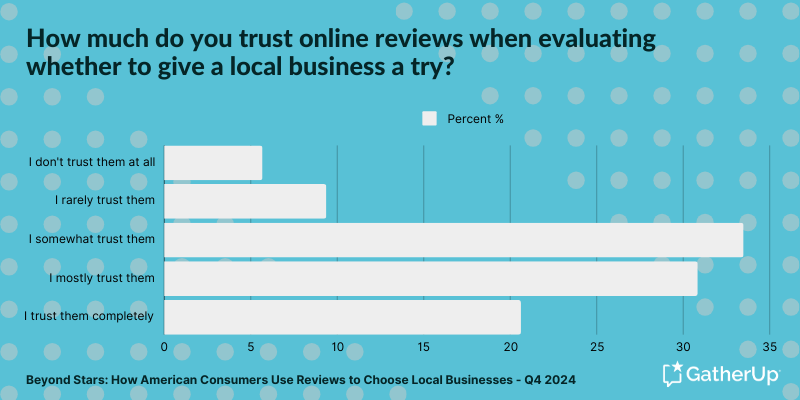
85% of consumers feel a degree of trust in local business reviews
Just 15% of the consumer public either rarely or never trusts reviews when deciding whether to give a local business a first try. 21% completely trust them, 31% mostly trust them, and 33% somewhat trust them at this critical moment in the buyer’s journey.
Your takeaway
With well over ¾ of your neighbors consulting your reviews to evaluate whether they should visit your business for the first time, this form of user generated content (UGC) may outweigh any other digital asset your brand possesses in terms of persuasiveness. Acquiring plenty of reviews that speak well of your company has become a table stakes local search marketing strategy.
60% of people trust what customers say about a business more than what a business says about itself
The fact that 29% of consumers place an equal amount of trust in customer sentiment and brand messaging is a hopeful sign that a little over ¼ of the public remains receptive to how brands like yours present themselves. However, just 12% of people will trust your brand narrative over the story which customers are telling about your business.
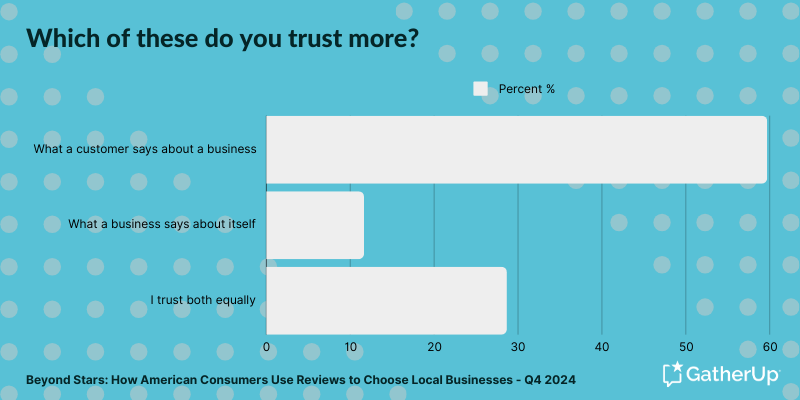
60% of people feel more trust in the sentiment of fellow consumers than they do in anything your business can say about itself.
Your takeaway
Having an authentic and trustworthy brand narrative still matters, but is now far outweighed in importance by your customers having a positive tale to tell about their experiences with your company via content like online local business reviews. A combination of providing excellent service both offline and online + actively acquiring reviews that speak well of your brand will ensure that your neighbors are encountering plenty of the type of content they trust most when they are deciding whether to patronize your business.
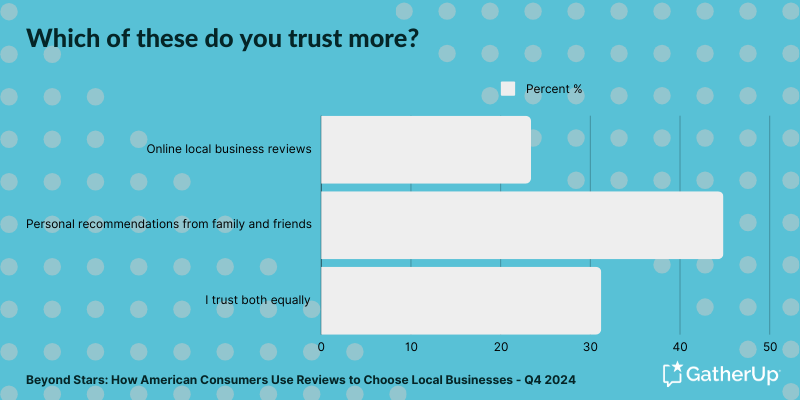
Only 31% of consumers trust reviews as much as personal recommendations
This finding will come as a surprise to readers who have seen other surveys indicating that reviews and personal recommendations are trusted equally. 45% of people feel the most trust in the recommendations of their family and friends, 24% place primary trust in online local business reviews, and just 31% trust both types of sentiment equally.
Your takeaway
It’s vital to appreciate the offline life of customers, and local businesses have an advantage of mindset in understanding that their patrons have full and busy lives off the web in their hometowns and cities. Providing excellent customer service is the first step to earning voluntary word-of-mouth (WOM) recommendations, but a variety of encouragements should be explored to inspire current customers to mention your brand to their circle of friends and family. Consider loyalty programs, referral programs, special reward offers, cross promotions, and community involvement that give neighbors cause to speak well of your brand to one another.
Fewer than 1% of people never read reviews before choosing a local business for a transaction
The astonishing degree to which consumer behavior has been altered by the existence of local business information becoming accessible on the internet is seen in the fact that over 99% of people now consult online local business reviews at least some of the time before patronizing a nearby company. 47% always read online reviews, 32% frequently read them,
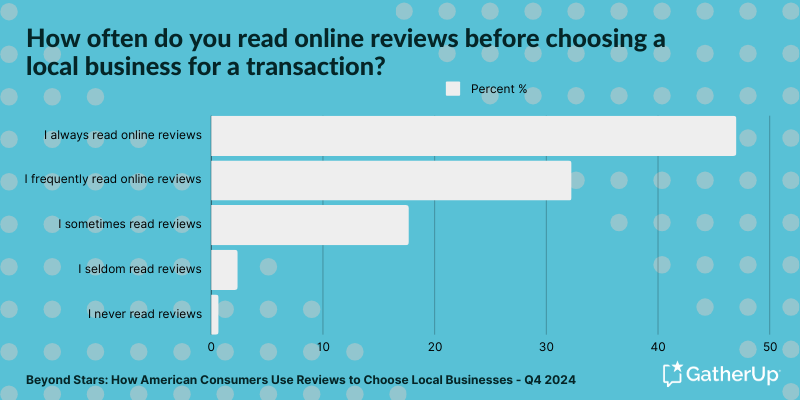
and 18% sometimes read them before choosing a local business. Just 2% seldom consult this content.
Your takeaway
With a combined 97% of consumers always, frequently, or sometimes reading reviews before choosing your business, it’s important to make a correct judgment about the value of this content. It is unlikely, for example, that 97% of visitors to your website are reading your company’s About page. The significant role reviews are playing in customer journeys dictates the necessity of prioritizing reputation management activities over many other traditional marketing efforts. Be sure your business strategy is earmarking priority time for review acquisition, response, and analysis.
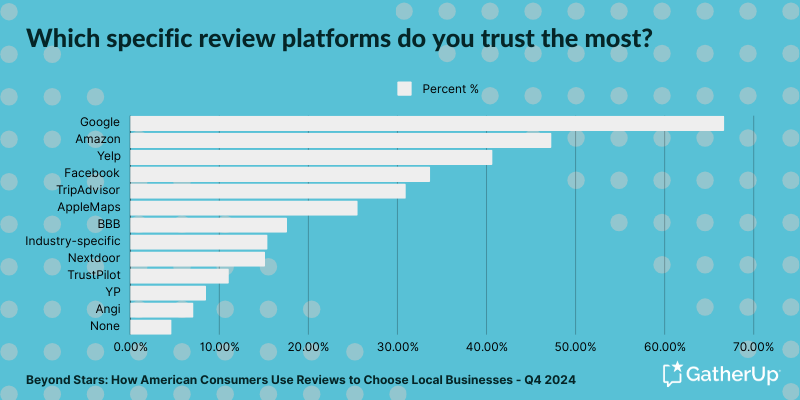
67% of consumers trust Google-based reviews over other platforms
Despite ongoing reporting of serious problems with review and listing spam in Google’s local business index, 67% of consumers list it as their most trusted review platform. Amazon is in second place at 47%, with Yelp at a fairly distant third at 41%. Facebook, at 34%, edges out TripAdvisor at 31% and Apple Maps at 26%. All other platforms, including Nextdoor, the Better Business Bureau, Angi, Yellow Pages, and industry-specific sites like Zillow, OpenTable,
FindLaw, and ZocDoc are seen as the most trusted review platform by less than 20% of respondents. 5% of respondents state that they do not trust any particular platform over another.
Your takeaway
Google’s dominant role in local consumer journeys means that nearly all local businesses must prioritize reputation management on this platform. Learning to play by Google’s rules is essential to your local search marketing strategy, but it cannot be your only effort. As our survey shows, consumers trust reviews across a broad spectrum of platforms, and winning their business necessitates having a good reputation on multiple sites. Discover which platforms matter most to the community surrounding each location of your business and build up a strong footprint there.
More than half of consumers are consulting social media for local business recommendations
In addition to looking at traditional review platforms for local business recommendations, 52% of consumers are consulting Instagram, 42% are consulting TikTok, 40% are consulting Reddit, and 39% are consulting YouTube. Twitter (X) trails behind at 29% with online local community hubs close on its heels at 23%, and offline and online newspapers coming in at just 21%. Local bloggers are a source for 17% of respondents.
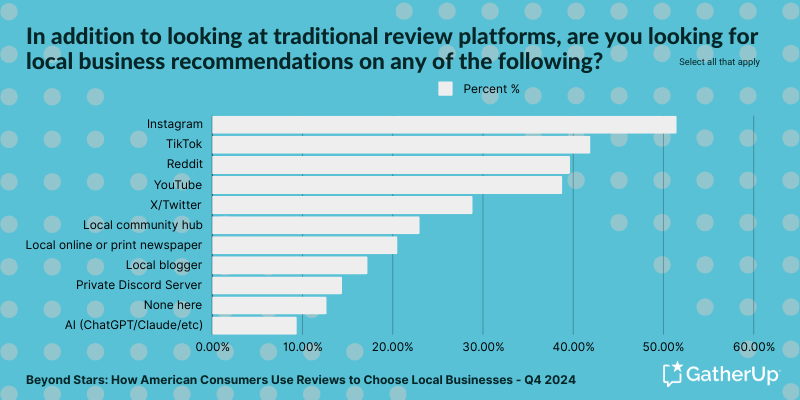
A fascinating finding is the emergence of private Discord servers at 14%. Meanwhile, despite all the hullabaloo surrounding it, AI tools like ChatGPT are being utilized by just 9% of consumers looking for local business recommendations.
Your takeaway
Only 13% of today’s consumers are not turning to an alternative form of local business recommendations beyond traditional review platforms. Survey the communities in which your brand serves to discover their preferences and devote resources to building a strong presence on these platforms.
.png)
59% of consumers spend more time reading reviews than they did 5 years ago
Over half of consumers are devoting more time to perusing review content in 2024 than they were in 2019. Just 21% are spending either the same amount of time or less time than they used to in reading this form of UGC. This is a significant upward trend surrounding the use and popularity of these local business assets.
Your takeaway
Possible contributing factors might include:
- The COVID-19 pandemic prompting the public to depend more on the internet to evaluate nearby businesses during social distancing
- The remote work trend ensuring that more people are spending more time online in general
- The ongoing evolution of use of the internet in daily life leading more people to become aware of the existence of review platforms over time
- The high cost of remote shipping options causing consumers to seek local alternatives for fulfillment to save money
- Remote supply chain problems causing consumers to seek local alternatives for fulfillment, in general
While none of the above may accurately explain the growing popularity of review platforms as places where consumers are spending time, these are statistics you should share with brand leadership, team members, and clients to earn buy-in for increased resources for reputation management.
90% of consumers read 3 or more reviews to form opinions about local businesses
The majority of consumers polled (48%) form an opinion of a local business by reading 3-5 reviews, while 30% go on to read 6-10 reviews and an additional 13% read more than 10. Just 10% make up their mind after reading 1-2 reviews.
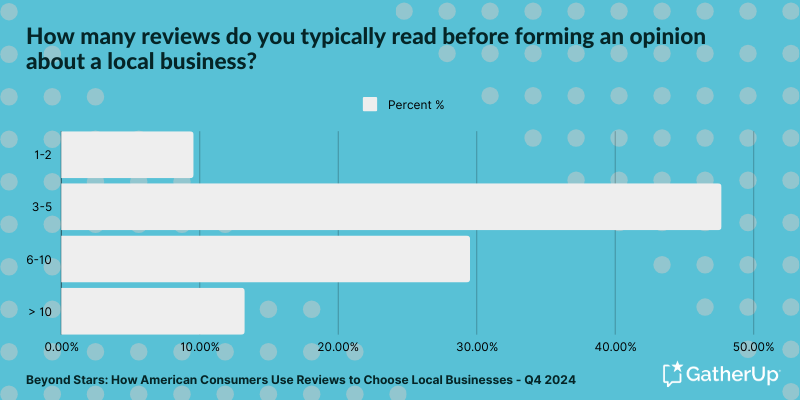
Your takeaway
It’s heartening to know that your local business won’t be summarily dismissed by the majority of consumers after they’ve read just a couple of reviews. Most go on to read several instances of consumer sentiment before they’ve formed an opinion of your brand. These statistics emphasize the necessity of delivering a level of customer service that results in potential patrons finding it easy to quickly locate a handful of positive reviews of your organization. If, however, unmanaged negative reviews are making serious inroads on your profiles, problems at the business must be addressed to limit the number of consumers forming poor opinions of your company after taking a cursory look at its online reputation.
.png)
Overall star ratings appear less important to consumers than review recency and sentiment
67% of consumers state that the last time they looked at local business reviews, they sorted them to see whichever reviews were most recent. 50% sorted to see lowest-scored reviews, and 43% sorted to see highest-scored reviews. Just 11% did not sort reviews, indicating that the majority of modern consumers make use of sorting options or customize the UGC they are most interested in seeing.
The surprise statistic in this set is that just 23% selected looking at the overall star rating of the business the last time they consulted reviews.
Your takeaway
It could be that the apparent lack of interest in overall star ratings sensibly reflects the understanding that such data reflects the entire review history of a business, and is not useful to consumers whose priority is discovering how a business is performing right now. After all, a restaurant that served the best pizza in town 10 years ago may have undergone management changes, altered its recipes, or fallen down on customer service policies since it opened its doors. In this light, consulting most recent reviews is logical, and highlights the need for a reputation management strategy which ensures that your business is receiving an ongoing stream of fresh review content. However, answers to this particular question should be compared to the further findings of this report on the specific star ratings consumers require in order to do business with your brand.
Only 3% of customers will choose your business if your average rating drops below 3 stars
43% of people require a 4-star overall average rating in order to feel confident about choosing your business, while 24% will still give a business with a 3-star rating a try. 31% expect perfection and will not choose a business with less than a 5-star rating. Just 2% will patronize a 2-star business, and less than 1% will elect to transact with a 1-star brand.
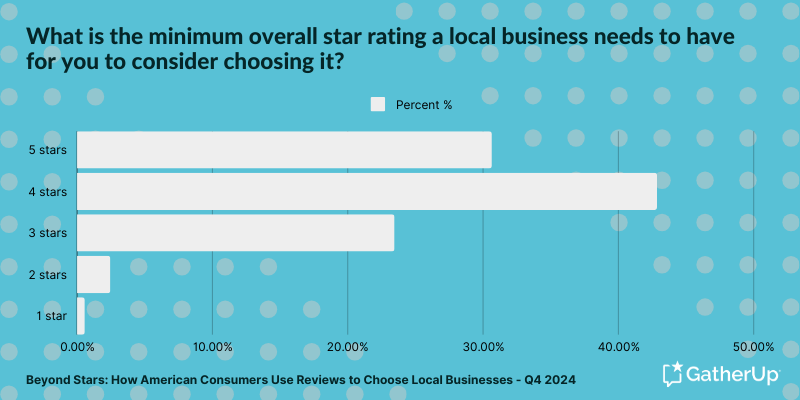
Your takeaway
The majority of consumers do not expect perfection. A combined total of 69% of people are quite willing to transact with your brand even if you lack a flawless 5-star average rating. Most reasonable potential patrons know that a few negative reviews are normal for any business and don’t represent a deal-breaker. Nevertheless, be sure your customer service policies and employee training programs are keeping negative reviews to a bare minimum. The higher your overall average rating, the more you can expect to be chosen for transactions.
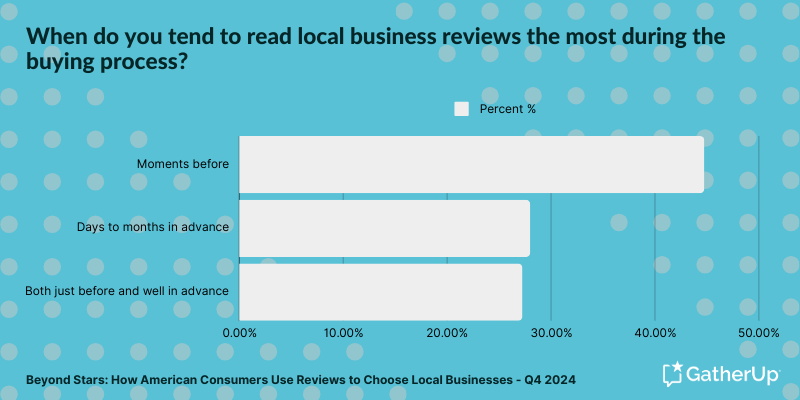
45% of consumers read reviews on the verge of making transactions
While 27% of people read reviews both well in advance of and right before making transactions, the main trend revealed by this question is that the dominant group of consumers reads reviews when they are on the verge of doing business. 28% report reading reviews days, weeks, or months prior to a transaction.
Your takeaway
Nearly all local businesses share the goal of wanting to assist consumers in the transition from online research to offline sales. Having a click-to-brick strategy is crucial to bringing nearby customers down that last mile to your door. As these statistics show, reviews play a huge role in decisions made right when a customer is ready to choose a business, emphasizing the need for a serious investment in reputation management. Meanwhile, a separate takeaway exists here for particular industries. If you are in the hospitality or travel sector, or vend high-dollar products that tend to require lots of consumer research prior to purchase, you need to know that potential patrons are considering your brand long before you ever meet them. Taken in conjunction with the high trust placed in WOM recommendations and reviews, both customer service and loyalty programs deserve resources and attention.
Authentic reviewers are brand reputation gold
The most influential aspect of a reviewer’s profile is their photo, with 53% of survey respondents stating that this element helps them trust a review more than when a generic avatar is present. 49% list the reviewer using what looks like a real name instead of a screen name as increasing trust. 40% feel more trust when the review platform has given the reviewer a badge or title, and 37% have increased trust when the reviewer has photographed or filmed their experience.
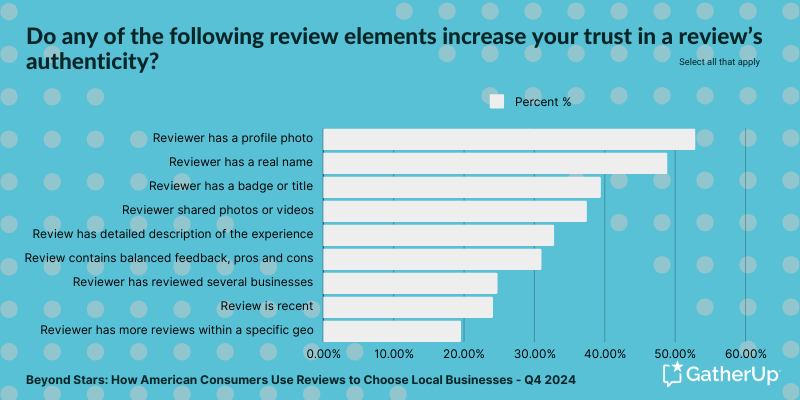
33% trust a review more when it contains a detailed description of an experience, and an additional 31% look for balanced feedback in the review. 25% trust reviewers more when their profiles show that they have left lots of reviews instead of only a few, and 20% are influenced by seeing that the profile is made up mainly of reviews of nearby businesses instead of companies around the country or world. 24% trust recent reviews more.
Your takeaway
In sum, your brand should do all it can to earn sentiment from reviewers who use a real photo and name, have earned a badge or title (like Google’s Local Guides), and who photograph or film their consumer experiences. It will also help if the way in which you ask for reviews encourages patrons to write thorough and balanced feedback. And, your reviews will be seen as more trustworthy by a smaller but highly discriminating portion of your community that takes the time to investigate whether your reviewers look active and local, instead of potentially spammy.
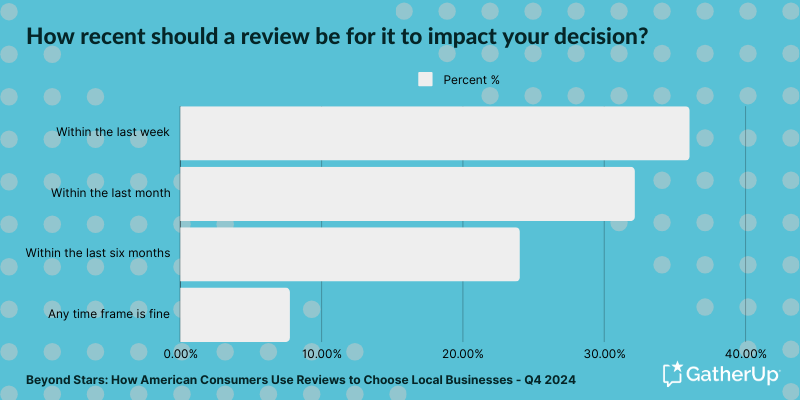
68% of consumers are most influenced by most recent review content
36% of people feel that a review should only impact their decision-making if it was written within the last week, while 32% are willing to extend that window of influence to a month. 24% find review content from the past 6 months to be relevant to their deliberations. Just 8% find any time frame acceptable.
Your takeaway
These statistics hint at a consumer crisis of confidence in the stability of nearby businesses. When 68% of consumers appear to be concerned that a business may have undergone major changes within recent days, it suggests that the public has lost faith in dependable commercial norms. Given this, your business should seek not only to achieve a steady stream of fresh incoming review content, but should also fine-tune your narrative to showcase reliability and longevity wherever possible. Social media is a good fit for featuring customer stories about families who have patronized particular businesses for multiple generations, proving that some brands can still be counted on in times of disruption and change.
60% of consumers lose trust in brands that use AI to respond to reviews
Amid AI hype, it’s a critical finding that the majority of your customers suspect you are responding to their reviews with AI. Just 25% say their trust is unaltered by this practice, while, for 15% of our group, this survey may have been the first time they realized that some brands are using this technology to automate owner responses, meaning that, going forward, their sentiment remains to be determined.
%20when%20it%20comes%20to%20local%20business%20reviews%20(1).png)
Your takeaway
Whenever possible, human sentiment about your brand should receive a human response. This shows respect for reviewers and keeps your company in close touch with the community being served. However, large enterprises face the very real problem of scale. If your brand is failing to respond in a timely fashion to a very large volume of daily, weekly, or monthly, one option is to hire more staff and another is to experiment with AI-based products. In the latter scenario, brands should evaluate whether a product is delivering responses that are obviously robotic, as our survey shows this will result in loss of the trust of the majority of customers.
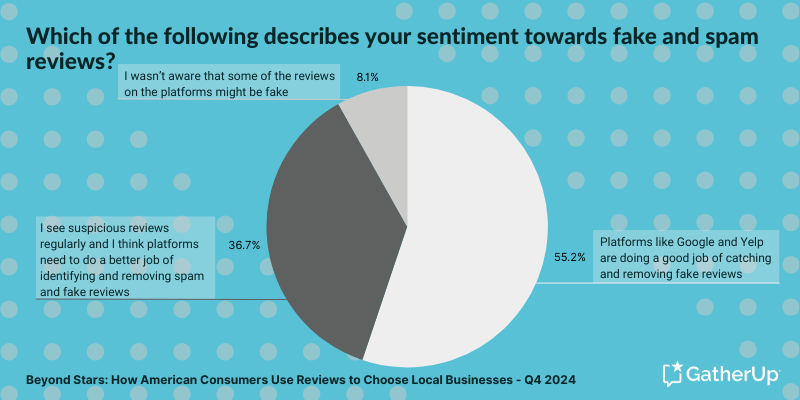
55% of consumers believe review platforms are winning the spam battle
The trust the public places in the authenticity of reviews is underpinned by this finding that over half of respondents believe that entities like Google, Yelp, and TripAdvisor are doing a good job of catching and removing fake reviews. Interestingly, 8% are simply unaware that some of the reviews they see might be fraudulent. A less sanguine 37% say they frequently encounter suspicious reviews and believe the major review platforms need to do a better job of removing this content.
Your takeaway
Given the power of reviews to generate sales for your business, local brands have a tremendous stake in whether or not the major platforms are seen as trustworthy by consumers. If all potential patrons mistrusted review content, it would cease to be an influential driver of transactions. Thus, it’s good news that 55% of respondents think the majors are winning the review spam battle, but the size of the less trusting group should not be overlooked. Taken in conjunction with the earlier statistics on how media like photos and videos of consumer experiences increase trust in reviews, efforts to acquire this type of content should be prioritized to provide a more credible experience for nearly 40% of your customer base.
The Core Habits of Local Business Review Writers
Due to the high reliance on online reviews in the consumer buyer journey, customers are highly engaged with local business reviews. In fact, 42% actively leave feedback after nearly every transaction, and another 39% do so at least occasionally. This means the majority of customers are already inclined to share their experiences. However, significant opportunities exist to engage the remaining 58% through timely, well-crafted review requests. Thoughtful asks, simplified processes, and compelling narratives about the value of their feedback can help boost review volume significantly.
Google remains the dominant platform for review activity, with 60% of consumers using it to share their experiences, followed by Amazon (48%) and Yelp (38%). However, consumers also utilize a diverse range of platforms, including social media, business websites, and even offline methods like suggestion boxes. This diversity highlights the need for businesses to maintain a strong presence across multiple channels to meet customers where they are. Additionally, exploring emerging platforms such as Apple Maps and local community hubs can help capture untapped audiences and expand your reach.
42% of respondents are extremely active reviewers
The largest segment of our survey group states that they almost always leave a review after transacting with a local business, and a very healthy 39% will at least sometimes do so. 17% rarely review the businesses they patronize, while 2% never do.
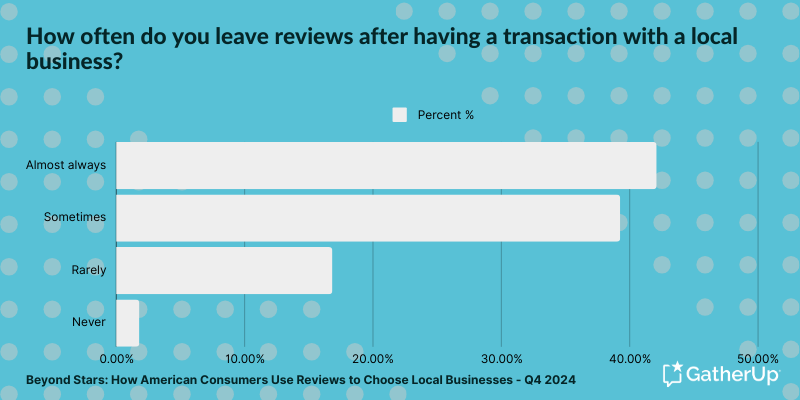
Your takeaway
While 42% of your customers may need little or no prompting to review your business, the remaining 58% should be seen as the primary focus of your review acquisition program. A well-written, well-timed review request could remind the large group that only sometimes leaves reviews that their sentiment would be appreciated. It could prompt those who rarely leave reviews to make your business the exception. As for those who never leave reviews, perhaps a set of instructions, a short link to your profile, or a human interest story about the vital role your business plays in the community could convert this small group.
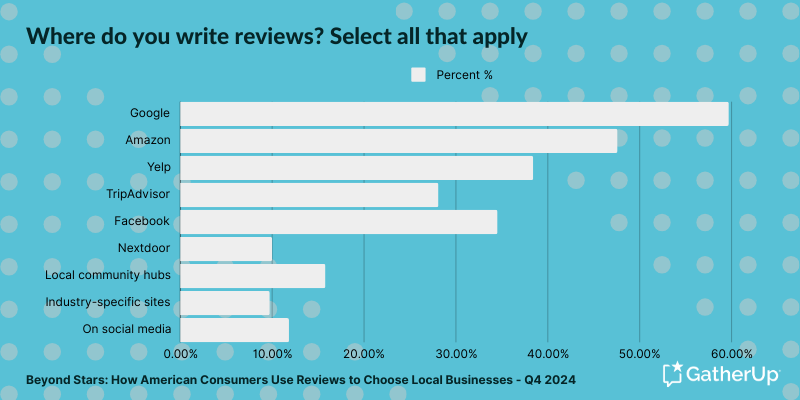
60% of reviewers publish their sentiment via Google
While Google takes first prize as the most-used review platform at 60%, they aren’t the only review game in town. Amazon comes second with 48% of consumers polled, while Yelp and Facebook are close competitors with 38% and 35% of reviewers, respectively. TripAdvisor sits at 28%, while Apple Maps is at 24% and Nextdoor at 11%. Local business websites that offer review forms are succeeding in bringing in reviews from 16% of those polled.
The more traditional in-store feedback and suggestion box still brings in reviews from 15% of customers - not seen on this chart to preserve data clarity and conciseness. Many smaller online platforms round out the rest of the field, including the Better Business Bureau, Yellow Pages, Angi, Trustpilot, industry-specific platforms like Zillow, social media platforms like Reddit, private Discord servers, and local community blogs, hubs, and podcasts.
Your takeaway
The number of places in which consumers are sharing and encountering sentiment about your business is remarkable! The case is clear for establishing a broad local footprint via the conversations and more formal reviews that the customer experiences your brand provides are inspiring. Pay attention to the quiet rise of Apple Maps, and don’t overlook the segment of your audience that includes customers who do their own publishing. They may have their own blog, podcast, or YouTube channel, and the power to introduce your business to more people in your community. Whenever you are feeling fatigued from a hyper-focus on Google, spend some time fostering new connections on alternative platforms.
Rewards and warnings dominate reviewer motivations
Reviewer motivations are complex. 72% of reviewers spend their free time writing sentiment about local businesses in order to reward them for great service. 60% feel called to warn their communities when a business doesn’t provide good service. A notable 31% turn to reviews when a complaint raised at the time of service was not resolved, leaving the dissatisfied customer to hope that their public feedback will receive a response from the brand.
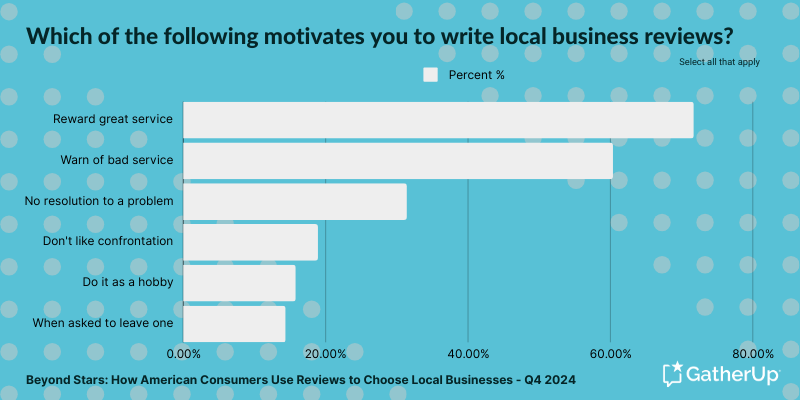
19% are uncomfortable with personal confrontations; instead of complaining about a problem at the time of service, they do so later and more remotely via a review. 16% consider it a hobby to review nearby businesses and those they’ve patronized while traveling. Finally, 14% of respondents feel motivated to write a review simply because the business asked them.
Your takeaway
If fear of reviews is something that has held your business back from fully engaging with this powerful form of UGC, take comfort in knowing that the largest segment of reviewers is motivated by the kind desire to praise nearby businesses. However, the impulse to look out for the good of their community is also a strong one; when an experience is truly bad and not resolved at the time of service, local brands can expect it to be publicized online by reviewers as a warning to neighbors. This finding highlights the bedrock necessity of training all staff in complaint resolution and escalation to limit the number of reviews received. An environment that invites in-person complaints could also encourage confrontation-averse patrons to speak up, knowing they will be respected and heard. And don’t overlook yet another statistic here demonstrating how the simple act of asking for a review can increase your review volume.
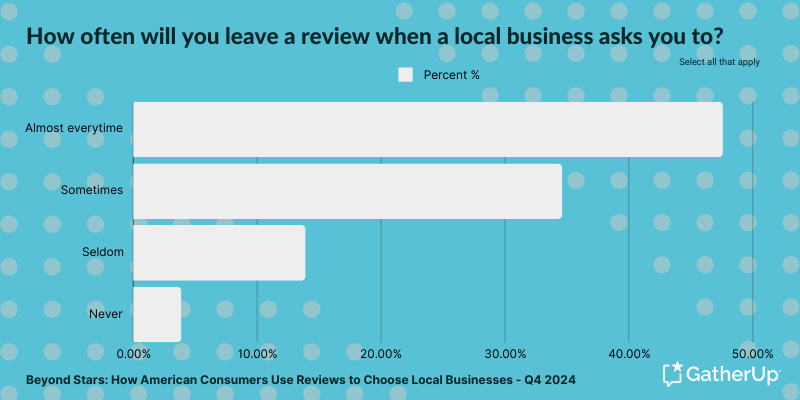
83% of customers are at least somewhat responsive to review requests
48% will typically leave a review and an additional 35% will sometimes leave a review when asked by a business. Just 14% are seldom responsive to review requests, and only 4% are completely unresponsive.
Your takeaway
It’s a magnificent gift to your business that nearly half of your customers are generous enough to spend free time reviewing your business if you take the time to ask. Additional effort on your part may be required to motivate the other half to review you. Experiment with different formats, such as email, SMS, and in-person asks. Emphasize how much the business contributes to the community and how sincerely a review would be valued. Run tests to discover ideal time windows for sending requests. And, be sure you are responding with thanks to all positive reviews to demonstrate that your brand is grateful to customers who share sentiment.
42 % of consumers haven't received a local business review request in over a month
30% of respondents had received a local business review request in the same week that they participated in our survey. 28% had received such a request within the last month. It had been over a month since 22% had been asked to review a local business, more than 6 months for 12%, and more than a year for 9%.
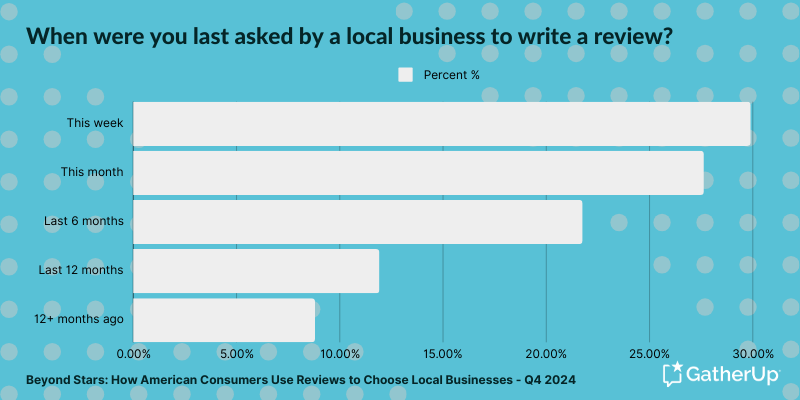
Your takeaway
The fact that a combined total of 58% of respondents had been asked to review a local business some time within the 4 weeks preceding our survey speaks very well of how many brands are devoting resources to review acquisition campaigns. The other combined statistic, however, is concerning. Given that consumers are constantly engaging in local transactions, but that 42% hadn’t received a review request in over a month or much longer, opportunity is being left on the table. A contributing factor could be that active reviewers in smaller communities may already have reviewed the majority of the businesses they regularly patronize, but new businesses are always opening doors and there are always new neighbors and visitors coming to town. Keep your acquisition campaigns running at all times.
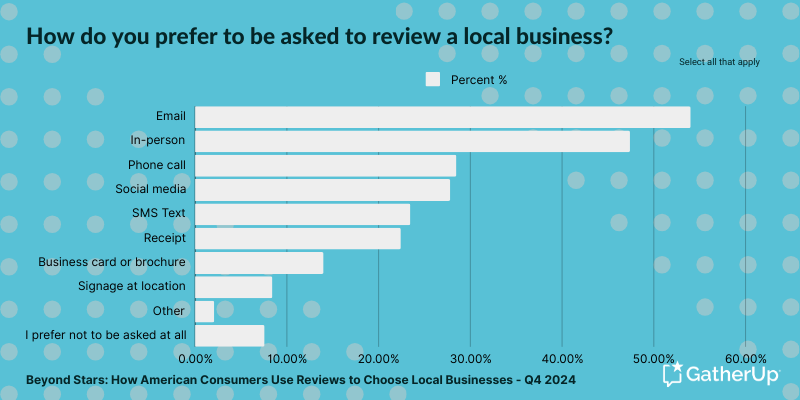
Only 8% of customers don't liked to be asked for reviews
Email is the top choice for review requests, with 54% preferring this methodology. 47% of customers like to be asked in person at the time of service for a review of their experience, while outreach through a phone call or on social media are both preferred equally at 28%. Texting comes in next, with 23% wanting the business to reach out to them via SMS while 22% like requests on invoices and receipts.
14% of customers like requests to be included on print materials such as business cards or brochures, and 8% prefer asks via storefront signage.
Your takeaway
The overwhelming majority of your customers don’t mind being asked for reviews, but they do have preferences for the way in which requests are communicated. The task for your brand is to experiment with all of the above methodologies to discover top performers for the community surrounding each location of your business. This could vary from city to city and region to region. Getting the right combination of request formats running at each branch could significantly increase request conversions.
66% of consumers prefer same-day review requests
47% of respondents prefer to be asked for a review at the time of service and an additional 19% want to receive a request within the same day that a transaction happens. 13% prefer the request to come the next day, and the same percentage like to be contacted for a review within 3 days. 7% prefer a week to transpire before receiving a request, and 2% expand that time window to two weeks.
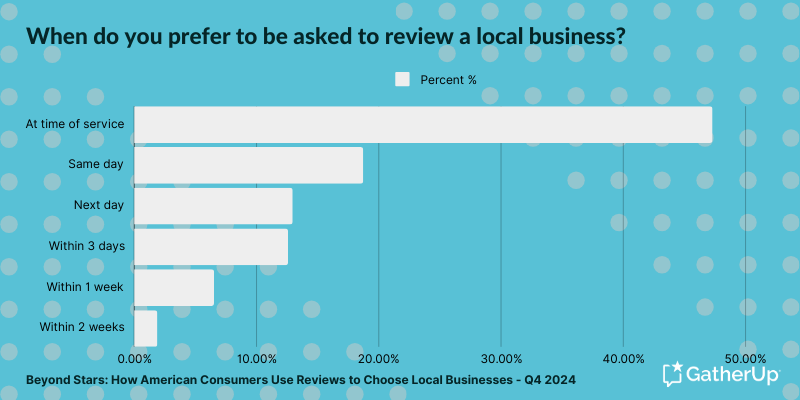
Your takeaway
The dominant trend here is that the majority of consumers surveyed either want to be asked for a review at the time of service or within the same day of doing business with you. This necessitates having an active 1:1 review request campaign at your place of business in which every customer is petitioned in person, plus a program that quickly follows up with a digital request. However, preferences could vary based on your industry and community. For example, a vacationer might not have time to review a hotel while on a trip, but could be responsive to a request days or weeks later once they have arrived home. Experimentation is key to find the most successful request cadence for your community.
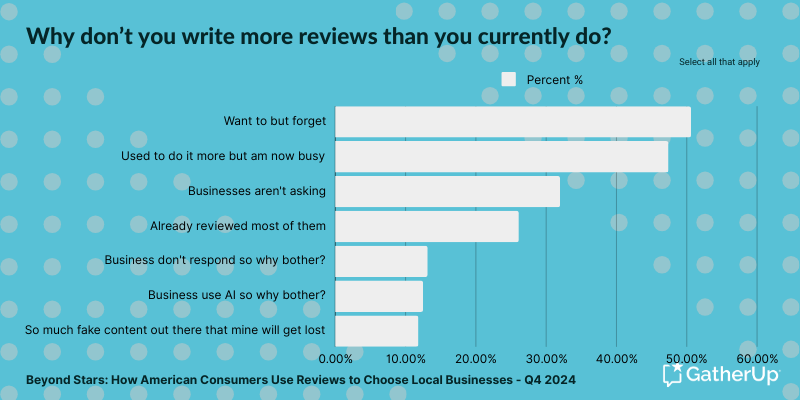
Forgetfulness and online distraction top the charts as review volume roadblocks
51% of consumers mean to write more local business reviews, but simply forget to. 47% say they used to write more reviews but are now finding themselves spending their screen time doing other things. A noteworthy 32% don’t write more reviews because businesses aren’t asking them to. 26% have hit the wall of having already reviewed most of the nearby local businesses they regularly frequent.
Take note of the 14% who have become discouraged from writing reviews because businesses don’t bother to respond, as well as the 13% who have been turned off by suspected AI-generated responses. 12% have seen so much review spam, they don’t feel it’s worth it to write a genuine review that will be lost in a clutter of fake sentiment.
Your takeaway
A combined total of 37% of polled consumers aren’t writing more reviews than they currently do because of neglect of owner responses and suspicion of both AI responses and spam. Take this as a challenge to your brand to be as authentic as you can on your end to encourage a trusting environment for more skeptical consumers. Meanwhile, a major takeaway here is that review requests can be just the reminder more than half of your customers need as a memo to write a review when they otherwise forget to. Of equal interest is the fact that people’s online habits may be changing. Nearly half of our survey base attests to writing less reviews in the past because they are spending more of their time online engaging in other activities. Again, your review request could help buck this trend in a distracting digital world. As for customers who have already reviewed most of their favorite businesses in town, a sophisticated acquisition strategy could discover whether they would be willing to review you on more than one platform.
Only 14% of people will try a business stamped with a review warning
If a platform labels a local business as being suspected of engaging in review spam, 37% of people will not transact with it. 17% will not recommend the business to family and friends, and if these groups mention the business, 18% of our survey group will share that the company has been caught for faking reviews. Just 14% see a review warning as a reason not to leave a review but, only 14% will give the business a try.
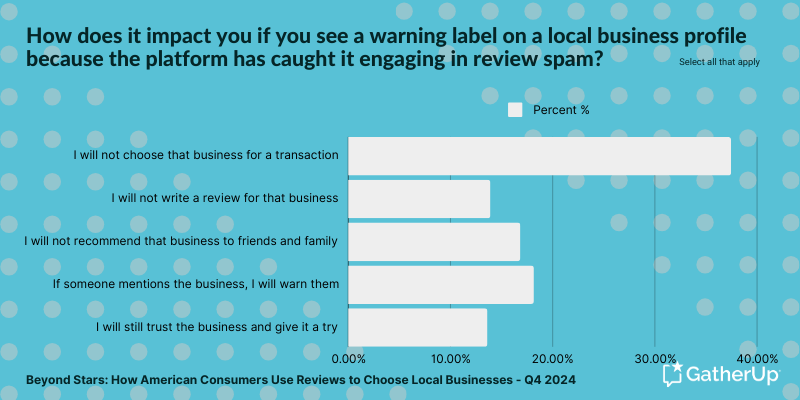
Your takeaway
While it’s predictable that review spam warnings will scare away a significant percentage of customers, some of these numbers are surprisingly low. The statistics indicate that consumers are more rigorous about protecting themselves than safeguarding other important people in their lives from brands that are allegedly engaging in review fraud. We can only speculate as to the cause of this; perhaps these warnings aren’t taken very seriously by the public as a sign of bad business practices. Nevertheless, the central finding here is that sales and trust are at risk for any brand that is engaging in forbidden and illegal review practices.
The Influence of Owner Responses to Local Business Reviews
Responding to reviews is no longer optional for businesses aiming to build trust and loyalty. An overwhelming 82% of consumers prefer choosing brands that actively respond to reviews, seeing it as an extension of customer service. In fact, 92% of consumers now consider owner responses a vital part of the customer service experience. These statistics highlight the necessity for businesses to adopt a responsiveness strategy that not only acknowledges feedback but also demonstrates attentiveness and care to both positive and negative reviews.
The impact of owner responses goes far beyond acknowledgment. When businesses respond to complaints thoughtfully, 73% of dissatisfied customers are willing to give them a second chance, and 54% will even update their negative reviews to reflect a better experience. On the flip side, ignoring negative feedback leads to significant consequences, with 59% of customers unwilling to return. These findings make it clear that owner responses are a key factor in customer retention, public trust, and overall brand reputation, underscoring the value of a proactive and human-centered approach to review management.
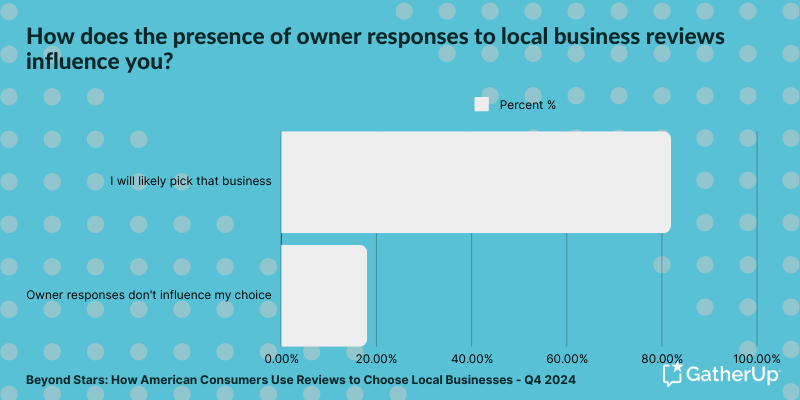
82% of customers prefer choosing brands that actively respond to reviews
When choosing where to transact, only 18% of the consumer public is not influenced by the presence of active business owner responses to online reviews. The overwhelming majority are more likely to choose local brands that are making the investment in a responsiveness strategy.
Your takeaway
This is one of the largest statistics discovered by our survey, and could be just what you need to persuade bosses and clientele to invest more in full review management. Active owner responses signal that your brand is attentive and accessible, building confidence and supporting sales.
92% of consumers now consider review responses as part of customer service
Just 8% of today’s customers do not consider responses to local business reviews as a component of providing good customer service. All the rest believe that, given how much time the consumer public now spends online, owner responses to reviews have become part and parcel of the customer service dynamic.
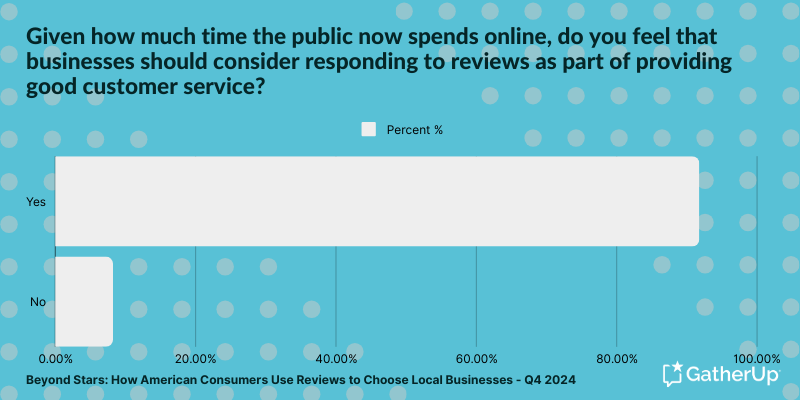
Your takeaway
This question yielded the largest statistic in our survey. It signals both the degree to which society has made the offline-to-online transition and the absolute necessity of re-envisioning modern customer service as including the quality of both digital and real-world consumer experiences. Online searchers can have either a good or bad experience with your brand when encountering the review portion of your local business listings. Impressions are formed and decisions are made based on how your business handles complaints and acknowledges positive feedback. Determine your brand will be one of the companies that is making the transition along with its customers.
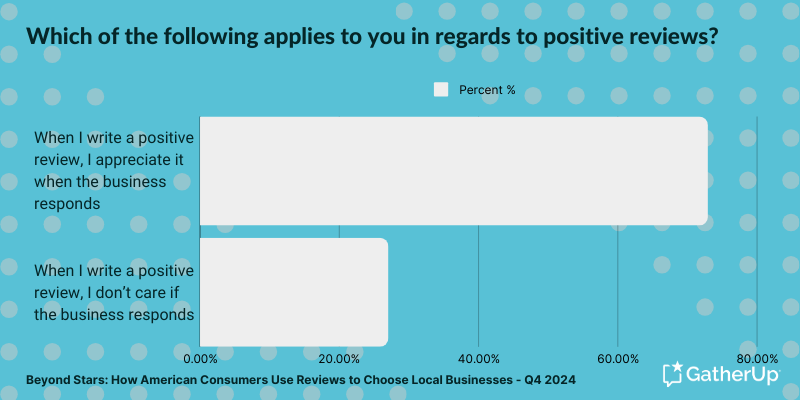
73% of reviewers appreciate thanks for positive feedback
Nearly ¾ of your customers will appreciate it if your business uses the owner response function to thank them when they have taken the time to leave a positive review. Your response lets them know that you have received their praise. 27% do not care whether a business responds to a positive review.
Your takeaway
All businesses would love to have the “problem” of being overwhelmed by positive reviews. In a sense, this achievement can come with a challenge: it takes creativity to think of different ways to say “thank you” to hundreds of reviews if you don’t want your owner response corpus to look generic or even robotic. One good tip is to share a tidbit of news about the business with some reviewers. For example, if a diner shared that they like the tacos at a restaurant, the owner might respond that they hope to see the patron again in a few weeks when their new seasonal tacos will be on the menu. A little extra effort could go a long way towards confirming that your business genuinely values customers and their incredibly influential praise.
79% of reviewers expect a response to complaints
A resounding majority of negative reviewers want their feedback to elicit a response from the brand. Just 21% do not want a response.
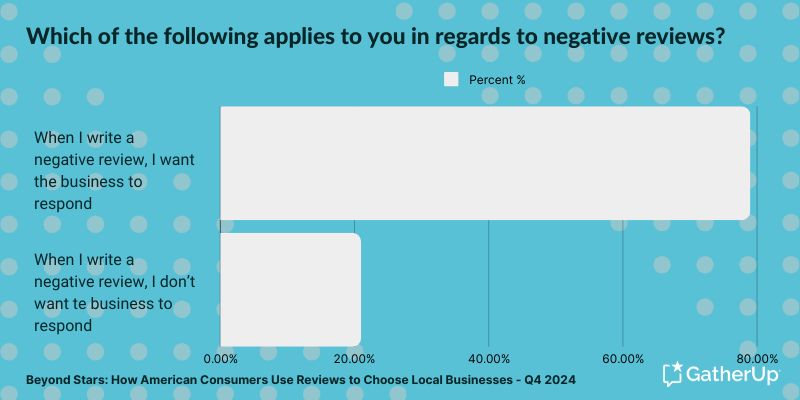
Your takeaway
It is interesting to note that this question and the one preceding it prove that about ¾ of consumers expect brands to respond whether the feedback being left is positive or negative. Just 6% more people expect a response to a complaint than they do to words of praise. The clear message is that, with some exceptions, customers are now awaiting your reply once they communicate via a review.
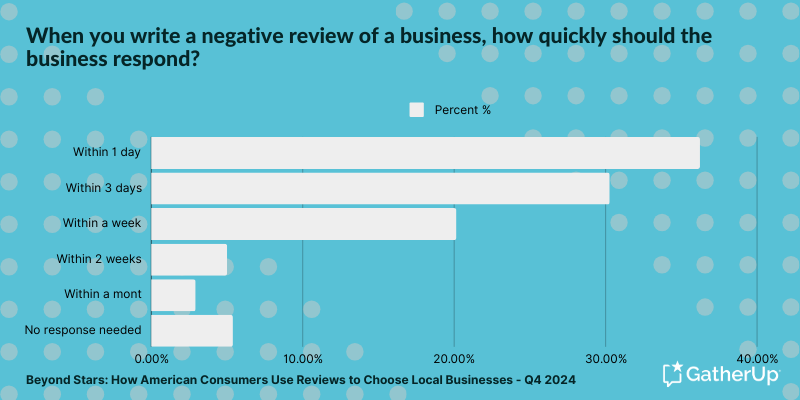
66% of negative reviewers expect a response within 3 or less days
When a customer leaves a negative review, 36% expect a response within 1 day, and an additional 30% expect a response within 3 days. 20% have more modest expectations of hearing back within a week, but only 5% extend that time frame to 2 weeks. 3% are open to responses that occur within 1 month of the complaint, and 5% do not want any response at all.
Your takeaway
While our survey has taught us that the majority of both positive and negative reviewers expect your brand to respond, you may need to prioritize attending to complaints first if time for review management is limited. There is a very brief window in which a dissatisfied customer is open to receiving your response. Reputation management software can organize incoming reviews across multiple platforms and help you meet response deadlines more efficiently.
Owners earn public trust with regrets and resolutions
When searchers see that a fellow consumer has left a negative review of a business, trust can be increased if the owner response includes a variety of key elements. 69% percent of respondents want to see the owner apologize for the customer’s bad experience and 67% want the owner to offer to make things right. 42% feel more trusting when the owner offers a phone number the customer can call for a resolution of the problem.
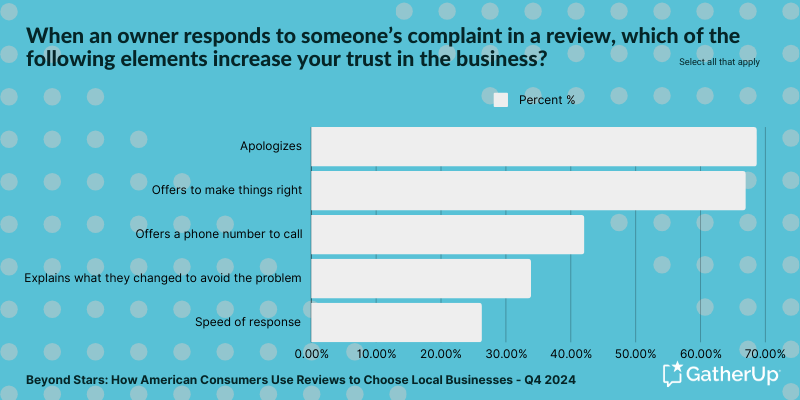
34% would like the owner to explain what changes have been made at the business so that the problem won’t happen again. 26% look for the speed with which the business has responded.
Your takeaway
Owner responses to reviews are a matter of public record and are visible to any potential customer who is consulting them to judge how your business treats customers when problems arise. Every legitimate negative review should be met with a swift response that not only apologizes and offers a path to resolution, but that persuades all potential patrons that you will treat them well if something goes wrong surrounding a transaction. It’s a matter of building trust on multiple levels at the same time.

73% of unhappy customers will give a business a second chance if an owner response solves their problem
If a brand responds well to a negative review, 73% of reviewers say they will give the company a second chance, and 54% will update their initial negative rating and review to reflect a better second experience. 40% of negative reviewers will recommend a business to friends and family because it demonstrated good customer service when a problem arose. 20% feel increased loyalty to the business because it was responsive when something went wrong.
Your takeaway
Each of these statistics is golden and belong at the center of your customer service strategy. Mistakes are inevitable in business, and fear of negative reviews is real but can be greatly ameliorated with the knowledge that customers are forgiving and can be won back with a caring response that solves problems. Answers to this question also reveal that more than half of reviewers see their feedback as a living document – not something set in stone – and are willing to update it when a bad first impression is corrected with a second positive one. You have so much power to prevent customer churn and it’s amazing to discover that increased consumer loyalty can actually be the outcome of a bad experience if your business prioritizes problem solving skills.
When negative reviewers are ignored, 59% won’t give the business a second chance
Nearly 6 in 10 consumers will never patronize a business again that has ignored their negative review. 53% are unlikely to recommend the business to friends and family because it has demonstrated a lack of commitment to good customer service. 44% are likely to tell their circle about being treated badly by the business, and 32% will actively seek out a different business the next time they need similar products or services because their complaint was ignored.
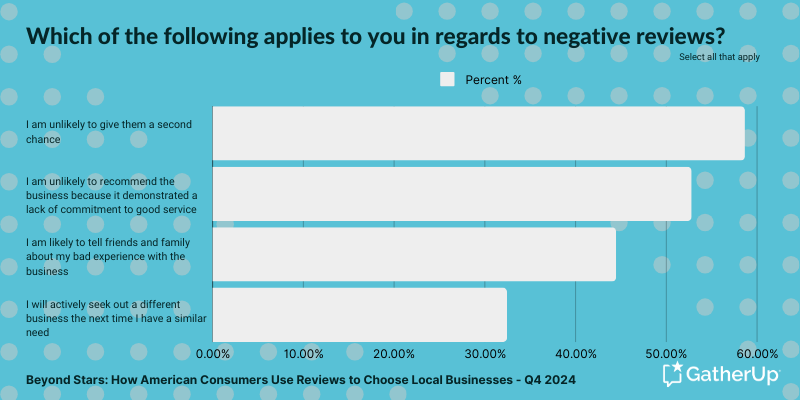
Your takeaway
It’s economic wisdom that it’s far more expensive to replace a lost customer than to keep them happy. Both your good reputation and bottom line are at stake when a negative review is ignored. The somewhat hidden cost is the number of additional potential customers who may never try your business because of a track record of your brand ignoring complaints. Neglected negative reviews must be seen as a serious business liability.
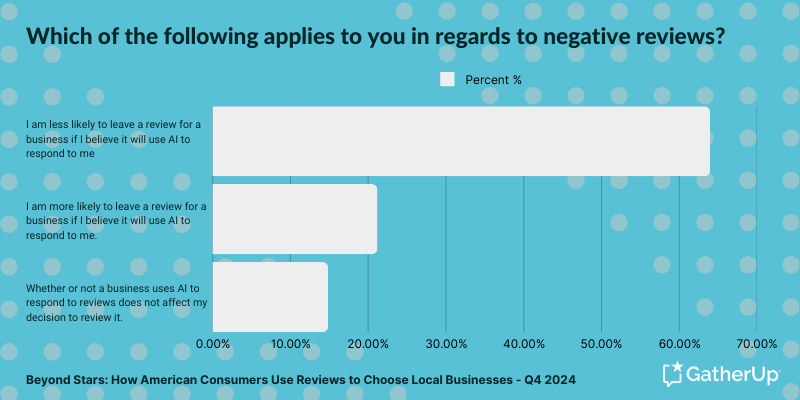
64% of consumers are discouraged from writing reviews if they expect AI to respond
More than 6 in 10 customers are less likely to bother writing reviews for businesses if they expect AI will be used to write an owner response. About 21% say they are more likely to review a business in this scenario, and for 15%, their decision to write reviews is not affected by whether or not the response will be generated by AI.
Your takeaway
While AI can be a useful tool in some settings, be wary of any technology that offends your customers or distances your business from them. AI may leave customers feeling like they have been handled rather than served. Choose your tools wisely with the goal of providing better customer experiences instead of shortcuts.
The data is clear: reviews are no longer just a supporting element of local consumer behavior—they are a central driver of trust, decision-making, and brand loyalty. Consumers are increasingly reliant on reviews to guide their choices, with many consulting them more frequently than ever before and responding positively to well-timed review requests. Furthermore, owner responses to reviews hold transformative potential, turning negative experiences into second chances and strengthening loyalty among customers who feel heard and valued.
Reputation management is now inseparable from exceptional customer service, as consumers expect businesses to engage thoughtfully with feedback at every touchpoint. From acquiring and analyzing reviews to crafting personalized, timely responses, your ability to manage your online reputation will directly impact your success. With GatherUp, you gain the tools and insights needed to harness the full power of reviews, build trust, and deliver remarkable customer experiences that drive growth and profitability. GatherUp can help.
